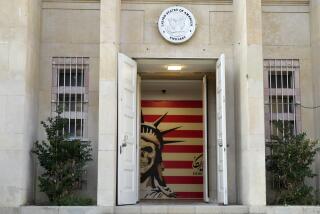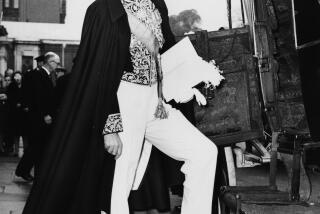John Sheardown dies at 88; Canadian envoy who aided Americans in Tehran
- Share via
John Sheardown, a former Canadian diplomat who sheltered fugitive American Embassy staffers at his Tehran home at great personal risk during the 1979 Iran hostage crisis, has died. He was 88.
Sheardown died Dec. 30 at an Ottawa hospital, his wife, Zena, said. He had been treated for Alzheimer’s disease for the last four years but also suffered from other ailments.
The second-ranked official at the Canadian Embassy in Tehran at the time of the Islamic Revolution, Sheardown played a key role in the events depicted in Ben Affleck’s Oscar-contender film “Argo,” although he was not portrayed in the film.
Almost a week after militant Iranian radicals seized the U.S. Embassy in Tehran on Nov. 4, 1979, taking 52 Americans hostage for 444 days in retaliation for U.S. support for the recently deposed shah, the Canadian diplomat received a call from one of the six Americans who had managed to evade capture. American consular officer Robert Anders was calling his friend Sheardown for help.
“What took you so long?” was Sheardown’s reply, said his wife.
After that phone call, the Sheardowns agreed without hesitation to shelter four of the six Americans in secrecy in their 20-room house in Tehran. Canadian ambassador Ken Taylor housed the other two Americans.
“It would have been selfish for us not to do so,” Zena Sheardown told the Associated Press from her current home in Ottawa. “There weren’t many places to hide in Iran, we had the room, they needed our help, and it was just not in John’s nature to refuse help to anyone.”
For 79 days, the pair lived a low-profile life in tumultuous Tehran, facilitating a household that was comfortable and welcoming for the Americans, while helicopters streamed overhead, everyone’s nerves calmed only by boisterous dinners together and heartfelt hospitality.
Though Sheardown might be best known for his role in what became known as the “Canadian Caper,” he was absent from “Argo,” which tells the story of how the CIA used a fake Hollywood film crew to rescue the six U.S. Embassy staffers sheltered by the Canadians. Affleck has apologized for leaving Sheardown out of the film, which he said was the result of time constraints and plot developments.
In a story posted in October on the Slate magazine website, one of the rescued American diplomats, Mark Lijek, said Sheardown’s role was “indispensable.”
“Without his enthusiastic welcome, we might have tried to survive on our own a few more days. We would have failed,” Lijek said.
Sheardown was made a Member of the Order of Canada for his role in the rescue. His wife later also received the award for her role.
The remainder of the U.S. hostages were released in January 1981.
Born in Sandwich, Ontario, later absorbed by Windsor, on Oct. 11, 1924, John Vernon Sheardown joined the Royal Canadian Air Force at age 18. He flew Lancaster bomber missions in World War II. On one mission, he barely managed to get his flak-riddled plane back to Britain. With the Lancaster losing power, he told his crew to bail out. He tried to wrestle the aircraft under control before opting to leap at the last minute. His chute barely had time to open and he broke both legs upon impact.
He stayed in the Canadian Armed Forces after the war, serving in Korea, before joining Canada’s immigration service around 1962. He was posted in London, Glasgow, New Delhi and Los Angeles during his 27-year diplomatic career.
Sheardown’s first marriage, to Kathleen Benson, ended in divorce.
He married his second wife, the former Zena Khan, in Los Angeles in 1975.
Besides his wife, he is survived by his sons, Robin and John Jr.; six grandchildren; 10 great-grandchildren; and two sisters. A daughter from his first marriage, Jackie, died in 2007.
More to Read
Sign up for Essential California
The most important California stories and recommendations in your inbox every morning.
You may occasionally receive promotional content from the Los Angeles Times.










